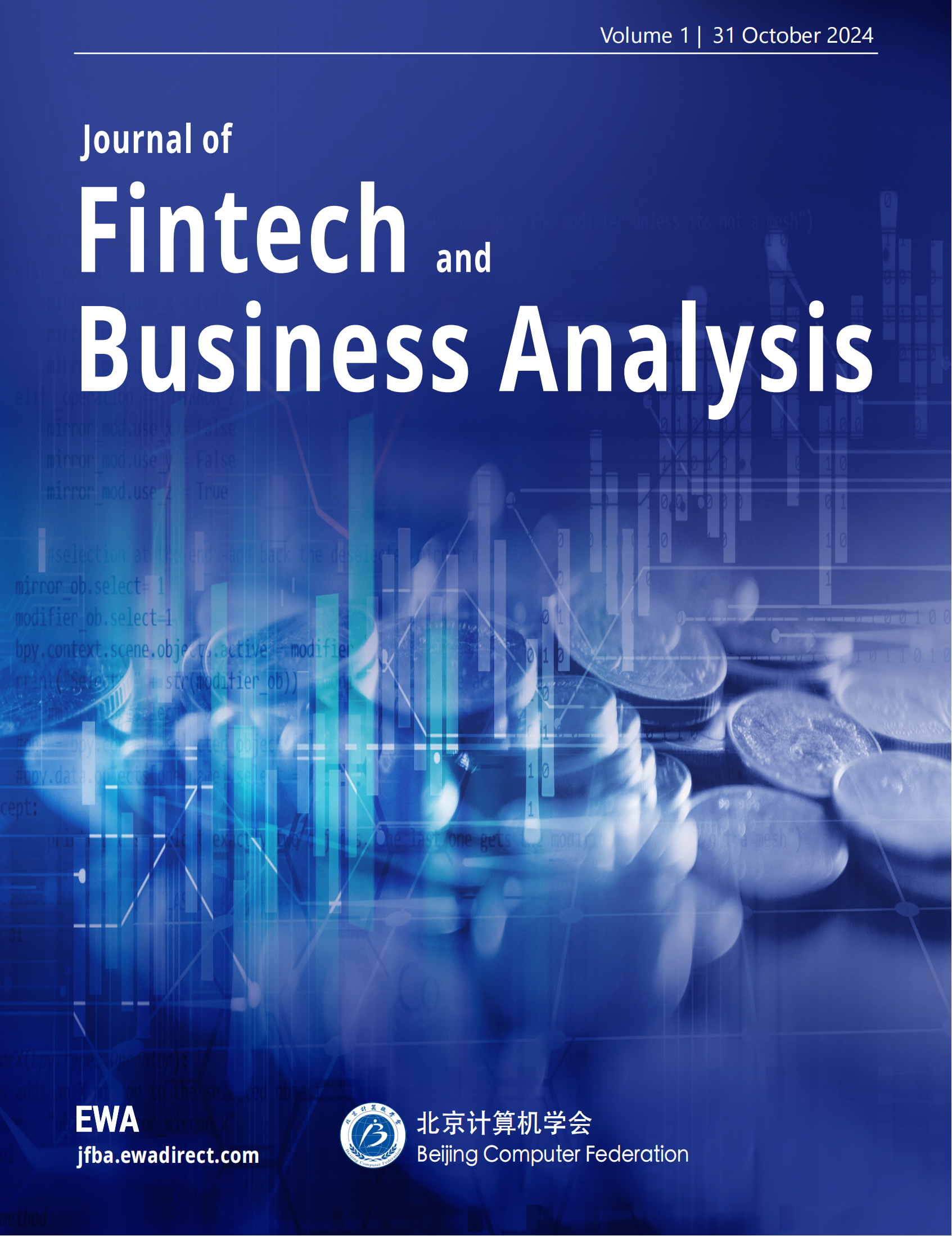1 Introduction
1.1 Overview of Digital Economy and Digital Art Economy
1.1.1 Definition and Characteristics of Digital Economy
The digital economy refers to the widespread application of digital technology in the economic system, leading to fundamental changes in the entire economic environment and activities [1]. It is based on information and communication technology, carrying out economic activities through digital means. Its characteristics include high efficiency, low cost, globalization, and paperlessness. The digital economy encompasses e-commerce, digital finance, online services, and more, realized through technologies such as the internet, big data, and cloud computing.
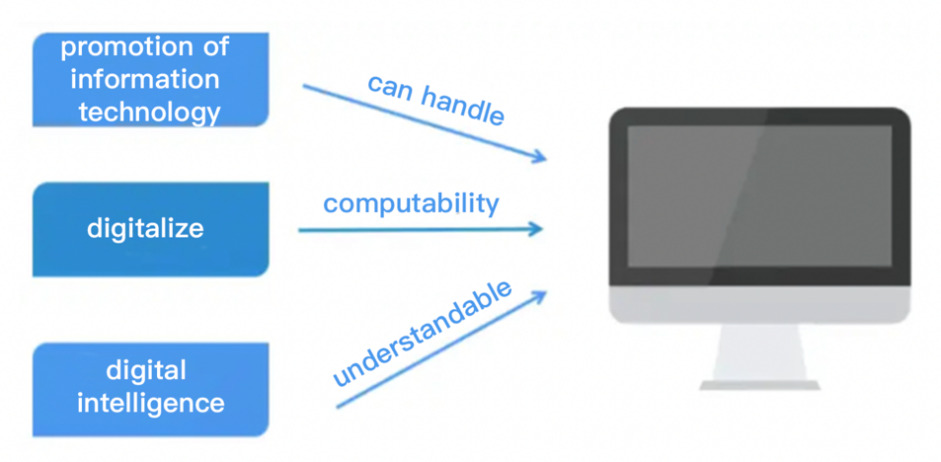
Figure 1. Digital Technology Intelligence
1.1.2 Definition and Characteristics of Digital Art Economy
The digital art economy is an important branch of the digital economy, involving the application of digital technology in art creation, dissemination, and transactions. Its characteristics include the diversity of digital artworks, convenience of dissemination, and market globalization. The digital art economy not only includes the creation and sale of digital paintings, music, videos, and other digital artworks but also covers the application of emerging technologies such as virtual reality (VR) and augmented reality (AR) in art.
1.2 Overview of Blockchain Technology
1.2.1 Basic Concepts of Blockchain
Blockchain is a distributed ledger technology that achieves data immutability and traceability through cryptographic principles. It is an innovative application mode of distributed data storage, peer-to-peer transmission, consensus mechanisms, encryption algorithms, and other computer technologies in the internet era [2].
1.2.2 Core Characteristics of Blockchain
Blockchain technology has core characteristics such as decentralization, transparency, immutability, and traceability [3]. These characteristics provide significant advantages in solving trust issues, enhancing data security, and reducing transaction costs.
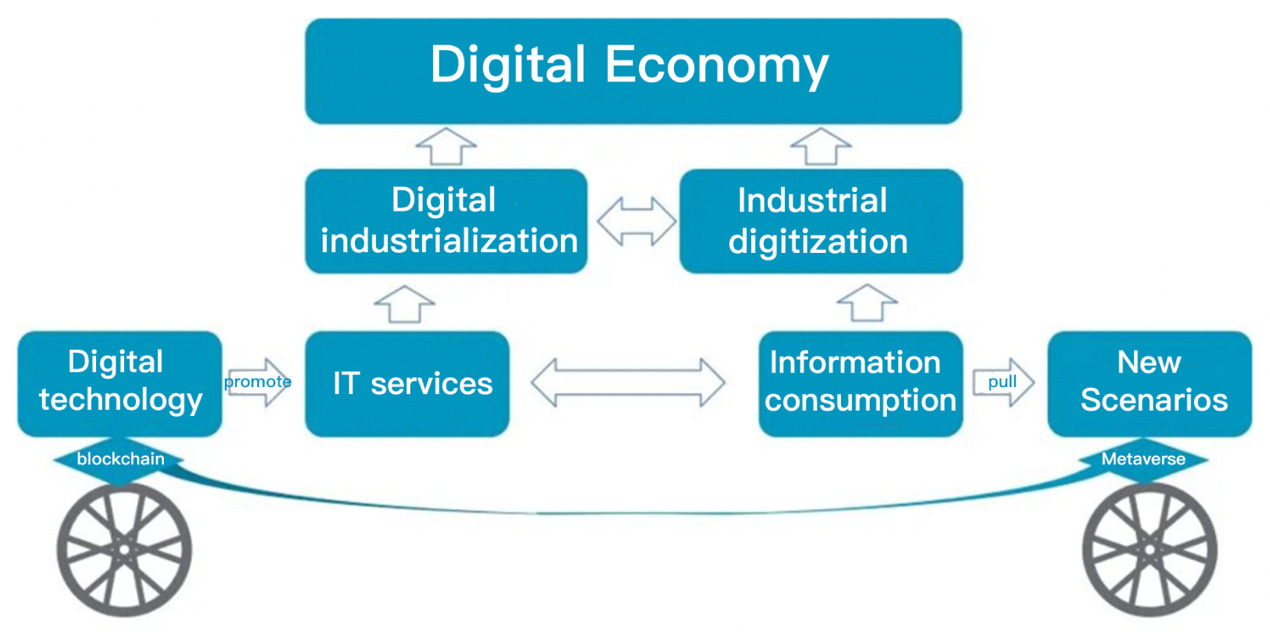
Figure 2. Integration Model of Digital Economy and Blockchain
1.3 Application Background of Blockchain Technology in Digital Economy and Digital Art Economy
1.3.1 Pain Points of Traditional Digital Economy and Digital Art Economy
Traditional digital economy and digital art economy face issues such as low data security, high transaction costs, and information asymmetry. The presence of intermediaries increases transaction complexity and costs, and the risks of data leakage and tampering threaten user interests.
1.3.2 Introduction of Blockchain Technology and Its Advantages
The introduction of blockchain technology provides a new solution for the digital economy and digital art economy. Through decentralization, blockchain technology can reduce transaction costs, enhance data security and credibility, and promote information sharing and collaboration.
2 Blockchain Technology Empowering Digital Economy
2.1 Blockchain Technology Improves Transaction Efficiency and Reduces Transaction Costs
2.1.1 Enhancement of Transaction Efficiency
Blockchain technology is a revolutionary and disruptive financial technology, extending its application scenarios to various fields of economic society, including finance, healthcare, communication, intelligent manufacturing, and more [5]. For example, the application of smart contracts allows transactions to be automatically executed, further reducing human intervention and errors (as shown in Figure 3).
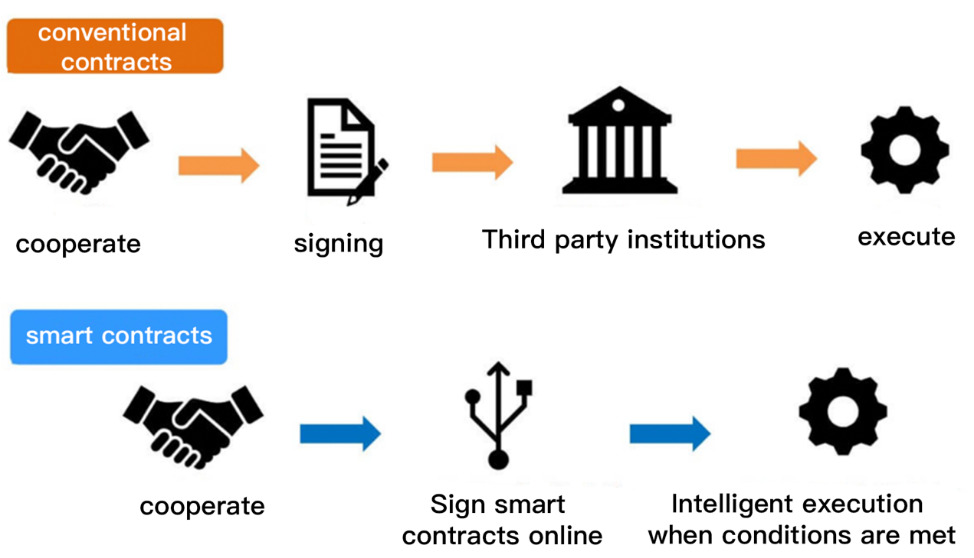
Figure 3. Differences Between Traditional Contracts and Smart Contracts
2.1.2 Reduction in Transaction Costs
The decentralized nature of blockchain technology can effectively reduce transaction costs. Coupled with an equal peer-to-peer trust mechanism and high security, transactions can be more convenient, intuitive, and safe, making them very suitable for modern application scenarios [6]. Additionally, blockchain technology can optimize processes, reducing resource waste and operational costs.
2.1.3 Blockchain Technology Enhances Data Security and Credibility
Blockchain's traceability and tamper-proof features enable secure transactions of IoT data [7]. Its transparency allows all transaction data to be publicly accessible, enhancing the credibility of the data. All parties can view transaction records in real time, reducing information asymmetry and trust issues.
2.1.4 Blockchain Technology Promotes Information Sharing and Collaboration
Blockchain's distributed ledger allows all participating nodes to hold the same ledger copy, achieving efficient information sharing. When any node updates data, other nodes can synchronize in real-time.
3 Blockchain Technology Empowering the Digital Art Economy
3.1 Blockchain Technology Protects the Copyright of Digital Artworks
3.1.1 Current Status of Digital Artworks Copyright
Traditional copyright protection for digital artworks faces numerous problems such as unclear copyright ownership, rampant piracy, and difficulties in rights protection. These issues severely impact artists' enthusiasm for creation and the healthy development of the market.
3.1.2 Blockchain Technology's Copyright Protection Mechanism
Blockchain technology, with its decentralization, high transparency, and data immutability, brings revolutionary changes to the digital art field. By creating a unique digital fingerprint or identifier (commonly referred to as a digital certificate or hash value) for each digital artwork, blockchain technology accurately locks the identity of the work and confirms its uniqueness globally. This digital identifier not only represents the identity of the work but also serves as a solid shield for its copyright ownership. When a digital artwork is uploaded to a blockchain platform, its related information (including creator information, creation time, content description, etc.), along with this unique digital identifier, is encrypted and permanently recorded in the blockchain's distributed ledger. This recording process is both efficient and secure, as it does not rely on any centralized authority for verification or storage, greatly reducing the risk of data tampering or loss.
For artists, blockchain technology provides a powerful tool to defend their creative rights. Through blockchain platforms, artists can easily showcase proof of originality of their works to the world, and any potential copyright disputes can be quickly clarified by comparing records on the blockchain. When works circulate in the market or are used for commercial purposes, the records on the blockchain also provide strong legal evidence for artists, ensuring they receive due rewards from their creations.
The introduction of blockchain technology also enhances the transparency and trust of the digital art market. Buyers and investors can verify the authenticity and value of the works by consulting records on the blockchain, thereby reducing fraudulent activities.
This technology-based trust mechanism lays a solid foundation for the healthy development of the digital art market and creates a fairer and more just creative environment for artists.
3.1.3 Blockchain Technology Promotes the Trading of Digital Artworks
3.1.4 Drawbacks of Traditional Trading Models
Traditional trading models for digital artworks face issues such as multiple intermediaries, high costs, and significant risks. There is a lack of trust between buyers and sellers, the transaction process is cumbersome, and there is a high risk to fund security.
3.1.5 Blockchain-Based Trading Platforms
Blockchain technology provides a secure, transparent, and efficient platform for trading digital artworks. Buyers and sellers can conduct transactions directly through blockchain platforms, reducing intermediary links, lowering transaction costs, and ensuring the safety and transparency of transactions.
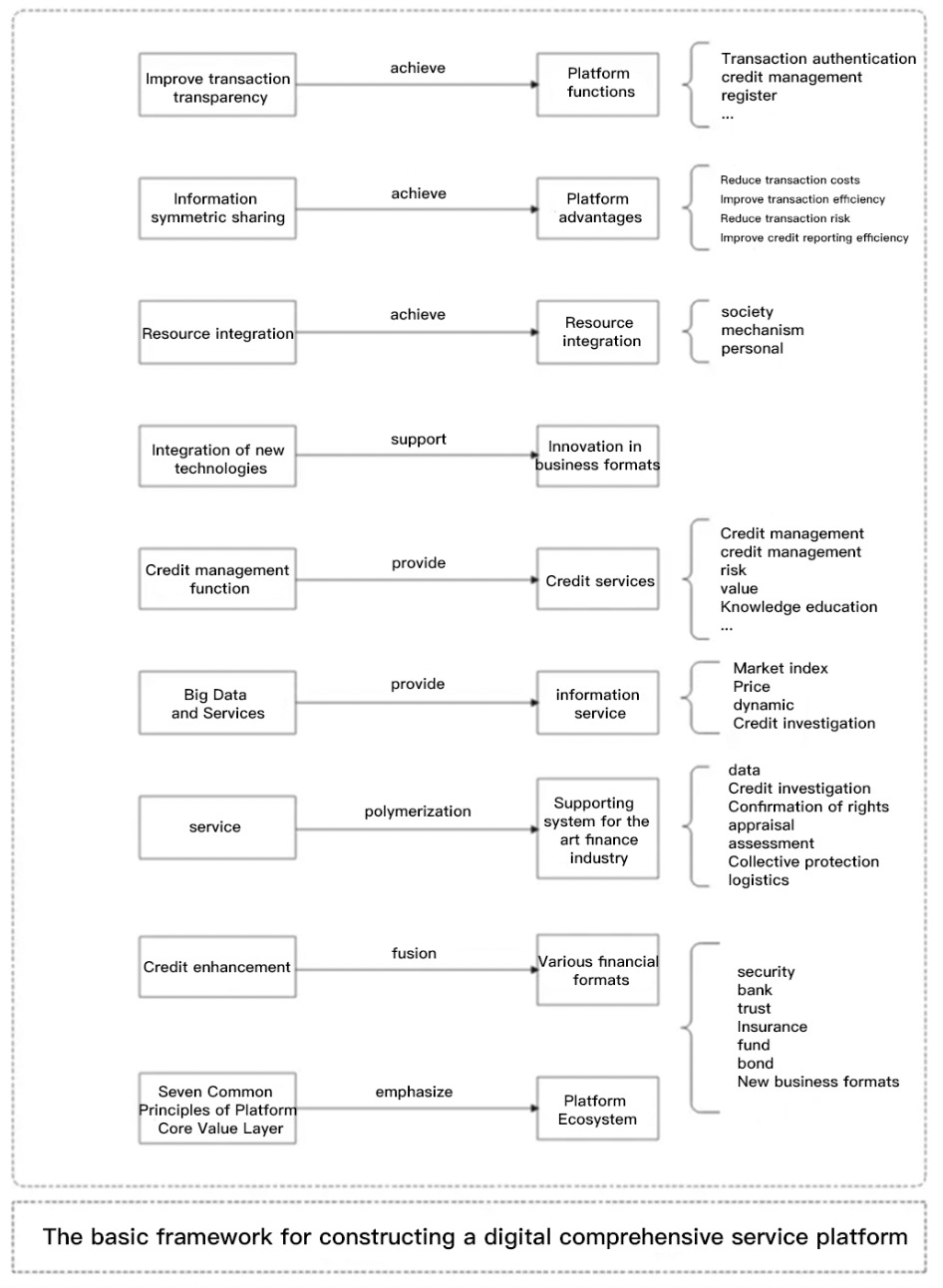
Figure 4 Basic Framework for Constructing a Digital Integrated Service Platform
The digital integrated service platform aims to "realize" through functions such as transaction certification and credit management, reducing transaction costs, improving transaction efficiency and transparency, while integrating new technologies with art finance to build an open, collaborative ecosystem, and promoting the prosperity and development of the digital economy (as shown in Figure 4).
3.2 Blockchain Technology Fosters New Business Models in Digital Art
3.2.1 The Rise and Application of NFTs
Non-fungible tokens (NFTs) are a major innovation of blockchain technology in the field of digital art, providing new channels for the creation, sale, and collection of digital artworks (as shown in Figure 5). NFTs ensure each digital artwork's uniqueness and scarcity, enhancing its market value.
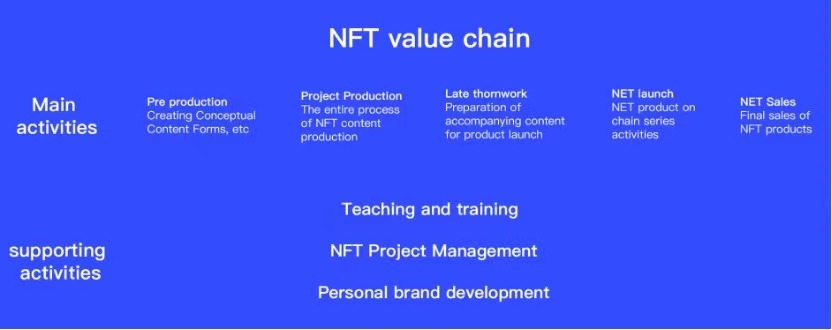
Figure 5. NFT Value Chain
3.2.2 Exploration of Emerging Business Models
The application of blockchain technology has given rise to emerging business models such as digital art crowdfunding, decentralized art platforms, and virtual art exhibitions (as shown in Figure 6). These models expand the creative and earning avenues for artists while providing consumers with more diverse choices and experiences.
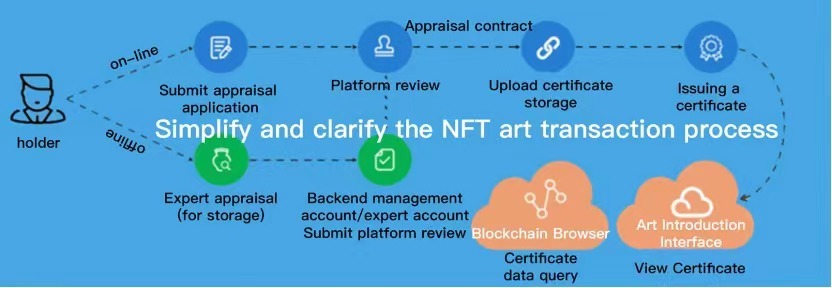
Figure 6. NFT Artwork Transaction Process
4 Application Cases of Blockchain Technology in the Digital Economy and Digital Art Economy
4.1 Digital Currency
4.1.1 The Birth and Development of Bitcoin
As the first application of blockchain technology, Bitcoin achieved the issuance and transaction of digital currency in a decentralized manner (as shown in Figure 7). The success of Bitcoin demonstrated the immense potential of blockchain technology in the financial sector.
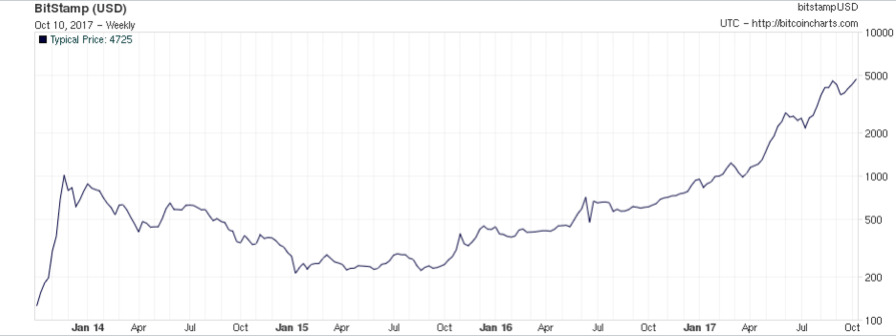
Figure 7. Bitcoin Value Trend
4.1.2 Applications of Digital Currency
Digital currency has been widely applied in various fields such as cross-border payments, financial services, and personal investments. Its decentralized, transparent, and efficient characteristics make it an important component of the digital economy.
4.2 Digital Art Trading Platforms
4.2.1 Operation Mechanism of the OpenSea Platform
OpenSea is one of the largest digital art trading platforms in the world. Utilizing blockchain technology, it provides a secure and transparent trading environment for the creation, sale, and collection of artworks. Each piece of art on the platform is identified and traded through NFTs, ensuring the authenticity of copyright and transactions (as shown in Figure 8).
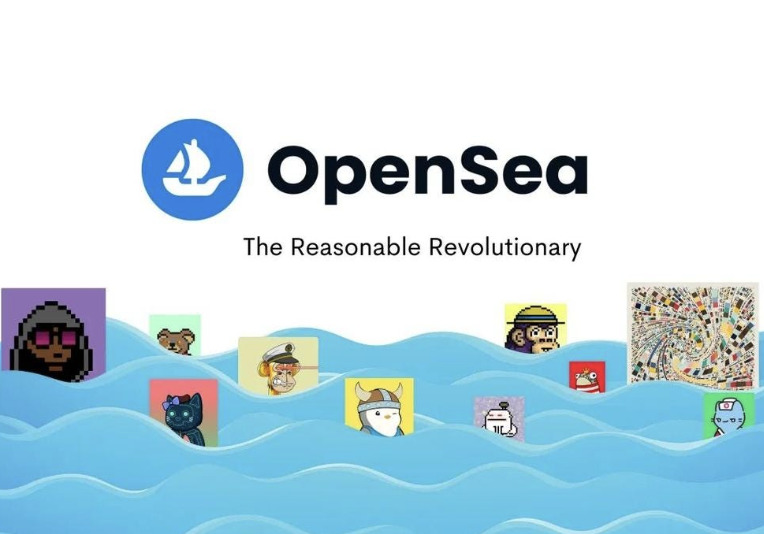
Figure 8. OpenSea Platform
4.2.2 Market Prospects of Digital Art Trading
With the continuous development of blockchain technology and the digital art market, digital art trading platforms will face greater market opportunities. An increasing number of artists and collectors are beginning to accept and participate in this new trading model, driving the prosperous development of the market.
4.3 Supply Chain Management
4.3.1 Issues in Traditional Supply Chain Management
Traditional supply chain management faces issues such as information asymmetry, complex processes, and low transparency. These problems not only affect the efficiency of the supply chain but also increase operational costs and risks.
4.3.2 Application of Blockchain Technology in Supply Chain Management
Blockchain technology provides a new solution for supply chain management through its transparency and traceability. By leveraging blockchain technology, all parties in the supply chain can share information in real-time and trace the production and distribution stages of products, improving the efficiency and transparency of the supply chain.
5 Future Development Trends of Blockchain Technology in the Digital Economy and Digital Art Economy
5.1 Application Prospects of Blockchain Technology in the Digital Economy and Digital Art Economy
5.1.1 Application Prospects in the Digital Economy
Blockchain technology will play an increasingly important role in future technological innovations and industrial transformations, significantly impacting the progress of the digital economy in China. Currently, the application of blockchain technology has extended to various fields such as digital finance, the Internet of Things, intelligent manufacturing, supply chain management, and digital asset trading [8].
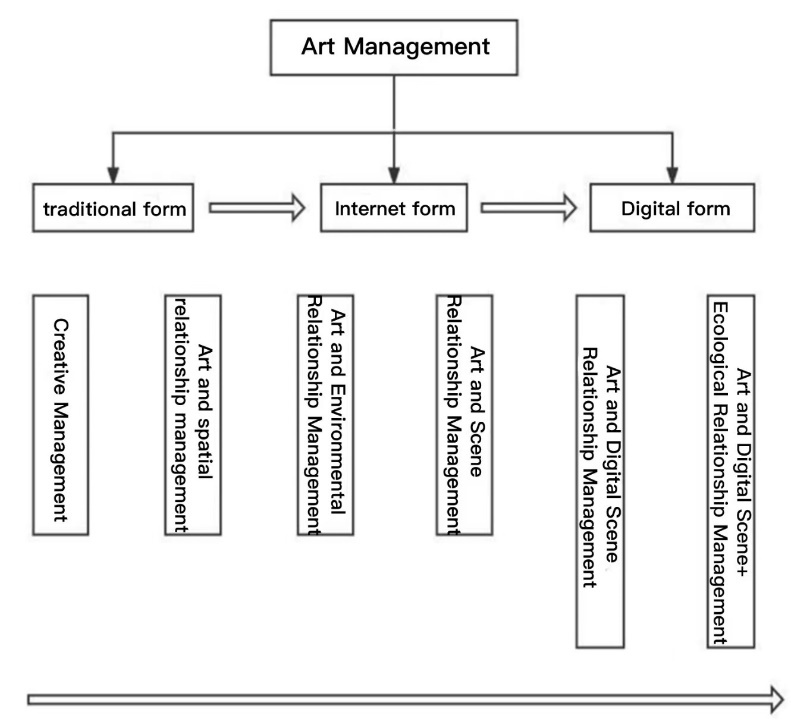
Figure 9. New Forms of Art Management
During the "13th Five-Year Plan" period, China has embraced the trend of a new technological revolution, vigorously developing the digital economy. This has not only positioned it as an important part of the national economy but also promoted the flourishing development of the digital industry and the steady advancement of industrial digitalization [9]. In this developmental process, new economic development forms have gradually emerged, with a clear direction toward integrated service platforms. This signifies that the digital economy will place greater emphasis on the comprehensiveness of services and the integration of platforms (as shown in Figure 9).
As the digital economy continues to develop, the construction of a new ecosystem has become an important topic. In this new ecosystem, the convergence of new business models is a significant feature. Various emerging business models are interwoven, collectively promoting the development of the digital economy. The establishment of an inherent mainline and the grasp of three key points are crucial for the healthy development of new business models.
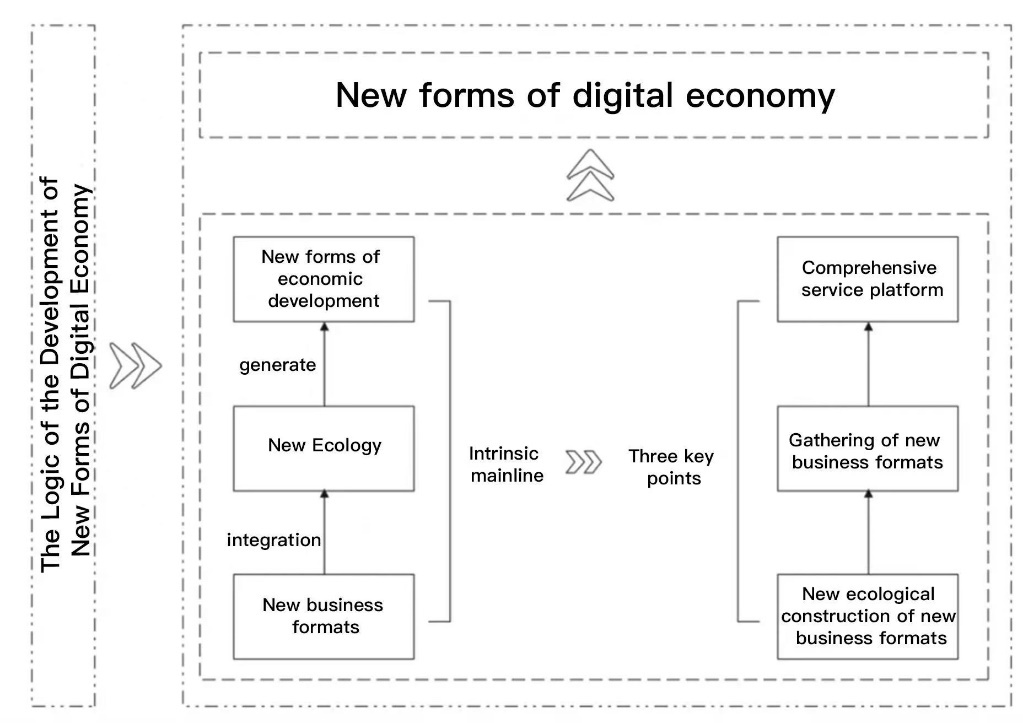
Figure 10. Logical Development of New Forms of the Digital Economy
In the construction of the new ecosystem, the new ecology of new business models gradually emerges. It not only inherits the advantages of traditional business models but also integrates new elements and characteristics of the digital economy. This construction of new business models not only drives the transformation and upgrading of the digital economy but also injects new vitality and momentum into social and economic development (as shown in Figure 10).
5.1.2 Application Prospects in the Digital Art Economy
Blockchain, with its unique structural design and advantages, particularly its core technologies such as "distributed consensus," "smart contracts," and "timestamp," brings significant technological innovation to digital copyright protection. It facilitates the breakthrough of copyright protection bottlenecks and forms a new order supervision mechanism that aligns with industrial needs, thereby promoting the healthy development of the digital publishing industry [4]. With the continuous development of the NFT market, the digital art economy will encounter more innovation and opportunities.
5.2 Challenges of Blockchain Technology in the Digital Economy and Digital Art Economy
5.2.1 Technical Challenges
Blockchain technology faces significant challenges in scalability, energy consumption, and data privacy protection. These technical issues need continuous research and innovation to be resolved.
5.2.2 Legal and Regulatory Challenges
The application of blockchain technology involves various legal and regulatory issues, such as the legality of digital currency, the legal validity of smart contracts, and data privacy protection. These issues require joint discussion and resolution by relevant departments and industries.
5.2.3 Market Acceptance Challenges
Although blockchain technology has many advantages, its complexity and novelty mean that market acceptance still requires time to improve. Enhancing the promotion and education of blockchain technology will help increase market acceptance and recognition.
5.3 Future Development Directions of Blockchain Technology in the Digital Economy and Digital Art Economy
5.3.1 Development Direction of Technological Integration
In the future, blockchain technology will further integrate with artificial intelligence, big data, and the Internet of Things, expanding its application scenarios and value. Through technological integration, blockchain will be able to provide more intelligent and efficient solutions.
Blockchain technology will be applied in more industries and fields, such as healthcare, education, and energy. By continuously expanding application scenarios, blockchain technology will bring more innovation and transformation to various industries.
5.3.2 Standardization and Normative Development
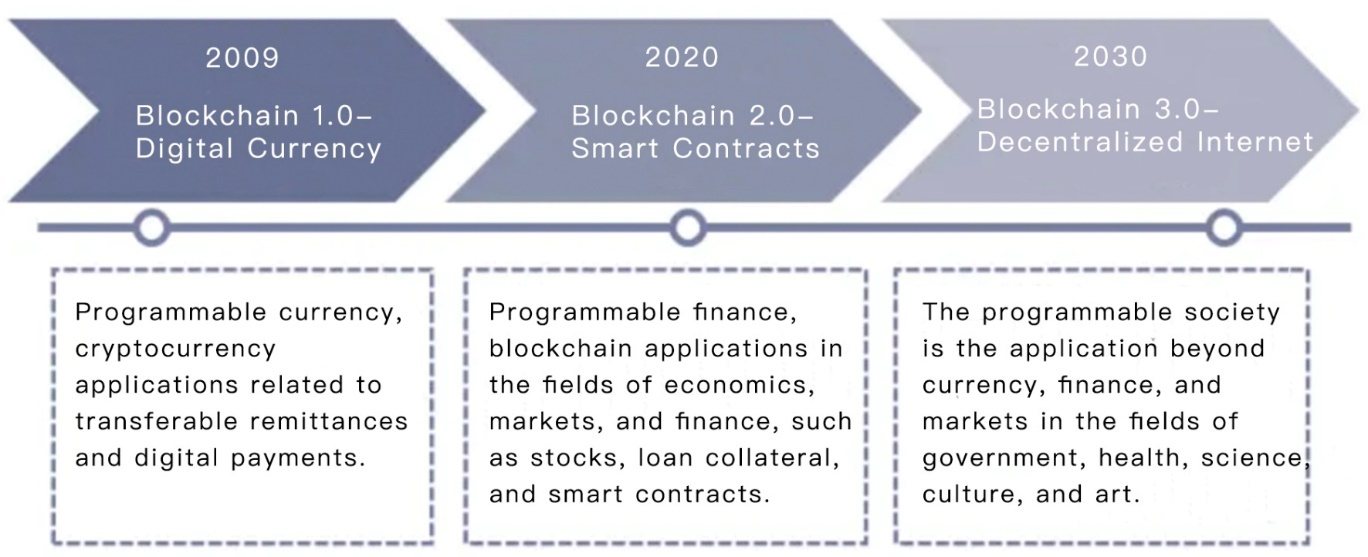
Figure 11. Development Trends of Blockchain
With the continuous development of blockchain technology, establishing unified technical standards and industry norms will help improve the interoperability of technology and the popularity of applications. Through standardization and normative development, blockchain technology will be better able to serve the development of the digital economy and the digital art economy (as shown in Figure 11).
6 Chapter 6 Conclusion
6.1 Research Summary
This paper theoretically analyzes and empirically studies the application of blockchain technology in the digital economy and digital art economy, exploring the dual roles of blockchain technology in these two fields. Through the analysis of relevant cases, it demonstrates the advantages of blockchain technology in improving transaction efficiency, reducing transaction costs, enhancing data security and credibility, and explores the application of blockchain technology in protecting digital art copyrights, promoting digital art transactions, and fostering new digital art business models.
6.2 Research Limitations and Future Prospects
Although this paper provides an in-depth analysis of the application of blockchain technology in the digital economy and digital art economy, there are still some research limitations. Future research can further deepen the exploration of blockchain technology applications in other fields, especially in terms of technological integration and the expansion of application scenarios. Additionally, addressing the technical, legal, and market acceptance challenges faced by blockchain technology in its application process will require more specific and feasible solutions in future research.
6.3 Implications for Industry Practice
The research results of this paper have certain implications for industry practice. The application of blockchain technology can effectively enhance the efficiency and security of the digital economy and digital art economy, providing new perspectives and methods for industry practitioners. Promoting and applying blockchain technology can facilitate the healthy development of the digital economy and digital art economy, driving technological innovation and application.
References
[1]. Zhang, H. (2018). How should Shaanxi catch up and surpass in the digital economy era? New Western, (2), 3. DOI: CNKI:SUN 0.2018-Z1-024.
[2]. Xie, Y. (2024). Analysis and research on blockchain and its forking problems [Doctoral dissertation, South China University of Technology].
[3]. Zhang, J., Wang, F., & Chen, S. (2019). Token economics of energy systems: Concepts, functions, and applications. Electrical Applications, 38(11), 10. DOI: CNKI:SUN.0.2019-11-016.
[4]. Li, J., & Wang, Z. (2017). New exploration of digital copyright protection driven by blockchain technology. News Knowledge, (10), 4. DOI: 10.3969/j.issn.1003-3629.2017.10.007.
[5]. Zhang, Q. (2017). Application conception of blockchain technology in the financial industry [Doctoral dissertation, Zhejiang University].
[6]. Xie, W. (2019). Research on efficient consensus and cross-chain mechanisms of permissioned blockchain [Doctoral dissertation, Shandong University].
[7]. Yu, F., Meng, L., Peng, J., et al. (2023). A blockchain-based secure transaction scheme for IoT data. Journal of Guangxi Normal University: Natural Science Edition, 41(4), 84-95.
[8]. Sun, Y., & Zhu, B. (2020). "Chain" connecting all things, "zone" moving innovation, transforming crisis into opportunity—Blockchain technology and digital economy development summit and 2020 intelligent data center construction and operation forum held grandly. Data Center Construction+.
[9]. Zhang, P., & Li, Y. (2021). Current status and development trends of digital economy in China. China National Conditions and Power, (8), 4. DOI: 10.13561/j.cnki.zggqgl.2021.08.04.
Cite this article
Yang,L.;Bai,X. (2024). Practice and Research on Blockchain Technology Empowering Digital Art Economy. Journal of Fintech and Business Analysis,1,8-18.
Data availability
The datasets used and/or analyzed during the current study will be available from the authors upon reasonable request.
Disclaimer/Publisher's Note
The statements, opinions and data contained in all publications are solely those of the individual author(s) and contributor(s) and not of EWA Publishing and/or the editor(s). EWA Publishing and/or the editor(s) disclaim responsibility for any injury to people or property resulting from any ideas, methods, instructions or products referred to in the content.
About volume
Journal:Journal of Fintech and Business Analysis
© 2024 by the author(s). Licensee EWA Publishing, Oxford, UK. This article is an open access article distributed under the terms and
conditions of the Creative Commons Attribution (CC BY) license. Authors who
publish this series agree to the following terms:
1. Authors retain copyright and grant the series right of first publication with the work simultaneously licensed under a Creative Commons
Attribution License that allows others to share the work with an acknowledgment of the work's authorship and initial publication in this
series.
2. Authors are able to enter into separate, additional contractual arrangements for the non-exclusive distribution of the series's published
version of the work (e.g., post it to an institutional repository or publish it in a book), with an acknowledgment of its initial
publication in this series.
3. Authors are permitted and encouraged to post their work online (e.g., in institutional repositories or on their website) prior to and
during the submission process, as it can lead to productive exchanges, as well as earlier and greater citation of published work (See
Open access policy for details).
References
[1]. Zhang, H. (2018). How should Shaanxi catch up and surpass in the digital economy era? New Western, (2), 3. DOI: CNKI:SUN 0.2018-Z1-024.
[2]. Xie, Y. (2024). Analysis and research on blockchain and its forking problems [Doctoral dissertation, South China University of Technology].
[3]. Zhang, J., Wang, F., & Chen, S. (2019). Token economics of energy systems: Concepts, functions, and applications. Electrical Applications, 38(11), 10. DOI: CNKI:SUN.0.2019-11-016.
[4]. Li, J., & Wang, Z. (2017). New exploration of digital copyright protection driven by blockchain technology. News Knowledge, (10), 4. DOI: 10.3969/j.issn.1003-3629.2017.10.007.
[5]. Zhang, Q. (2017). Application conception of blockchain technology in the financial industry [Doctoral dissertation, Zhejiang University].
[6]. Xie, W. (2019). Research on efficient consensus and cross-chain mechanisms of permissioned blockchain [Doctoral dissertation, Shandong University].
[7]. Yu, F., Meng, L., Peng, J., et al. (2023). A blockchain-based secure transaction scheme for IoT data. Journal of Guangxi Normal University: Natural Science Edition, 41(4), 84-95.
[8]. Sun, Y., & Zhu, B. (2020). "Chain" connecting all things, "zone" moving innovation, transforming crisis into opportunity—Blockchain technology and digital economy development summit and 2020 intelligent data center construction and operation forum held grandly. Data Center Construction+.
[9]. Zhang, P., & Li, Y. (2021). Current status and development trends of digital economy in China. China National Conditions and Power, (8), 4. DOI: 10.13561/j.cnki.zggqgl.2021.08.04.





